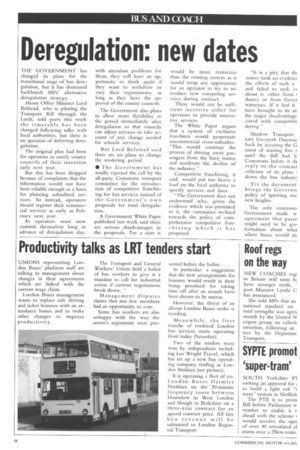Deregulation: new dates
Page 20

If you've noticed an error in this article please click here to report it so we can fix it.
THE GOVERNMENT has changed its plans for the transitional stage of bus deregulation, but it has dismissed backbench MPs' alternative deregulation strategy.
Home Office Minister Lord Be[stead, who is piloting the Transport Bill through the Lords, told peers this week the timetable has been changed following talks with local authorities, but there is no question of deferring deregulation.
• The original plan had been for operators to notify county councils of their intention early next year.
But this has been dropped because of complaints that the information would not have been reliable enough as a basis for planning subsidised services. So instead, operators should register their commercial services as early as February next year.
As operators must now commit themselves long in advance of deregulation day, with attendant problems for them, they will have an opportunity to think again if they want to withdraw or vary their registrations, as long as they have the approval of the county councils.
The Government also plans to allow more flexibility in the period immediately after deregulation so that councils can adjust services to take account of any change needed for schools services.
But Lord Belsread said there are no plans to change the tendering period.
• The Government has totally rejected the call by the all-party Commons transport committee for the introduction of competitive franchising for bus services instead of the Government's own proposals for total deregulation.
A Government White Paper published last week said there arc serious disadvantages in the proposals. For a start it would be more restrictive than the existing system as it would scrap any opportunity for an operator to try to introduce new competing services during contract.
There would not be sufficient incentive either for operators to provide innovative services.
The White Paper argues that a system of exclusive franchises would perpetuate uncommercial cross-subsidies. "This would continue the process of driving away passengers from the busy routes and accelerate the decline of the industry."
Competitive franchising, it said, would put too heavy a load on the local authority to specify services and fares.
"The Government does not understand why, given the evidence which was presented to it, the committee inclined towards the policy of comprehensive competitive franchising which it has proposed. '•It is a pity that di( mittee took no evidenct the effects of such a and failed to seek eN about it, either from I dustry or from Cove' witnesses. If it had it have brought to its al the major disadvantage: ciated with conmetitiv dering."
Shadow Transport tary Gwyneth Dunwoc back by accusing the G inent of waiting five r until the Bill had le Commons before it da reply to the commi criticism of its plans down the bus industrl Yet the document brings the Governrr policy of ignoring rea: new heights.
The only concessio Government made w agreement that passe might need to be giv, formation about whet where buses would stc




















































































